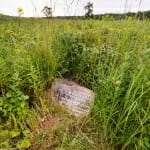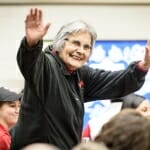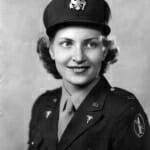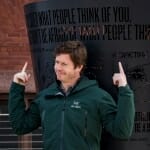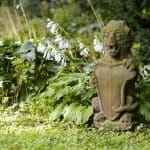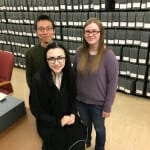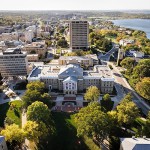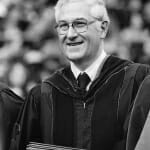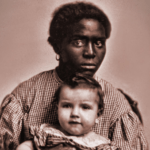Tag History
Nursing student upholds family tradition as fourth-generation Badger nurse
Following in the footsteps of her great-grandmother, grandmother and aunt, Emily Hanna is the fourth in her family to take part in UW–Madison’s nursing program. The program has seen some serious changes in that time. Read More
Lands We Share project about six state farms wraps up with Madison exhibit
Focusing on the intersection of farming, land, race, and ethnicity in the state, this initiative of the Wisconsin Farms Oral History Project set out with a goal of bringing people from diverse backgrounds together; people often separated despite living and working in the same towns or regions. Read More
UW Arboretum added to National Register of Historic Places
The Arboretum is recognized because of its restored habitats, landscape architecture, education and research, architectural elements, and its hosting of a Civilian Conservation Corps camp in the 1930s. Read More
Student-driven oral history project marks 50th anniversary of Black Student Strike on campus
"13 demands" recounts the Black Student Strike of February 1969 through the memories of more than two dozen people who organized, participated in or witnessed it. The protest, surging and ebbing over roughly two weeks, was among the largest in the university’s history. Read More
Ada Deer: A lifetime of firsts
Deer, a 1957 graduate, went on to become the first female chair of Wisconsin's Menominee Indian Tribe as well as a national leader in Indian affairs. Read More
Nursing pioneer Signe Skott Cooper: From the farm to the battlefield
Cooper devoted more than 60 years to nursing education at UW–Madison and within the UW System. Her wartime service shaped her life, personally and professionally. Read More
12 famous people you didn’t know went to UW–Madison
Homecoming is an occasion often involving food, friends and football — but it’s also a time to welcome Badger alumni back to campus. … Read More
Stone survivors: Law School gargoyles reunited after nearly 70 years apart
Some families have a dog or cat; the Been family has a gargoyle. Now, it’s going back to its original home at the University of Wisconsin Law School — and the intriguing story of its loss and recovery is being told. Read More
Bob Dylan’s electric guitar and leather jacket inspire a dissertation
The singer-songwriter’s controversial performance at the 1965 Newport Folk Festival inspired Rivka Maizlish to look into the debate over how Americans have defined "folk." Read More
Student to student: A reunion of ‘60s activists from Madison imparts lessons to millennials about achieving change
For three days in June, hundreds of aging radicals, activists and former University of Wisconsin students returned to Madison – once a “cradle of counterculture” – to relive the 1960s through a mix of music, art, politics and history. Today's millennials can learn from them. Read More
Students help capture campus protest voices from 50 years ago through public history project
UW–Madison students who helped collect and process audio interviews about the 1967 Dow protests on campus say they learned some valuable lessons from the accounts. Read More
Two faculty receive summer humanities research support from the NEH
Summer Stipends support continuous full-time work on a humanities project for a period of two consecutive months. The stipends support individuals pursuing advanced research that is of value to humanities scholars, general audiences or both. Read More
Chancellor Blank responds to report on student organizations that took name of KKK in 1920s
This report does not make for comfortable reading, nor should it," Blank writes. "It makes clear that the history our campus needs to confront is not merely that of these two groups or a particular set of individuals, but 'a pervasive culture of racial and religious bigotry.'” Read More
UW-Madison #throwback meme discovery made
Was the first meme ever first published in a 1921 humor magazine at UW–Madison? We think so. Read More
Ingersoll Physics Museum celebrates 100 years of hands-on education
Last year, more than 14,000 visitors came to the free museum to spin bicycle-wheel gyroscopes, crank electrical generators, and yank on pulleys. Read More
History Ph.D. candidate tells how immigrants from Mexico helped shape Wisconsin’s story
Ph.D. candidate Sergio González, who grew up in a tightly knit Latino community in Milwaukee, traces the diverse history of Mexicans in Wisconsin in his new book. Read More
UW Press book inspires national framework for teaching about slavery
A new report found a broad failure of textbooks, state standards and pedagogy to adequately address the role slavery played in the development of the United States — or how its legacies still influence us today. Read More




